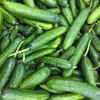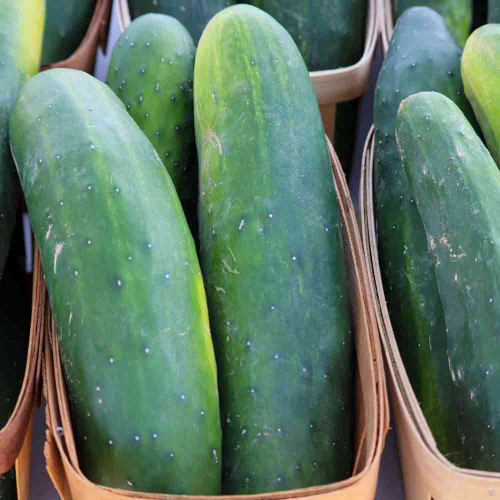Description
Beit Alpha Cucumber - Sweet, Crisp & Refreshing
We deeply respect - and actively seek out - truly resilient heirlooms proven across generations, especially those that thrive in demanding climates like our own high-desert Southwest. The Beit Alpha cucumber is a remarkable example, born from the challenging conditions of an Israeli Kibbutz in the 1930s through the pioneering work of Hanka Lazarson. Her ambitious goal wasn't just about survival in that climate, but about combining the coveted thin skin and sweet, non-bitter flavor of Middle Eastern cucumbers with consistent, abundant production – and she succeeded brilliantly, breeding a variety that exceeded expectations. The enduring success and global spread of this open-pollinated heirloom demonstrates Lazarson's exceptional breeding insight and perseverance, proving its value to home gardeners generation after generation.
Details
Prized for its notably thin, smooth skin, sweet flavor, crisp texture, and notable productivity, the Beit Alpha cucumber is a highly regarded type popular among home gardeners and growers worldwide. This offering is a traditional, open-pollinated heirloom strain that needs insect pollination and is typically grown as a vigorous, vining annual with strong stems. Expect vines to readily climb supports, commonly reaching 4 to 6 feet or longer when trellised, making vertical growing ideal. The abundant foliage helps shade developing fruit. Leaves are characteristic of cucumbers – large, somewhat triangular or heart-shaped with pointed lobes, and a slightly rough texture. The plant produces yellow, five-petaled flowers, typically bearing separate male and female blossoms on the same vine, often in large flushes once established.
It matures quickly, producing harvestable fruit 50 to 65 days from sowing, and performs well in USDA Zones 3-10 during the appropriate warm season.
Beit Alpha cucumbers are best harvested when relatively slender and medium-sized (typically 5-8 inches for slicing, smaller for pickling). The fruit is generally straight or slightly curved with smooth, uniformly dark green, glossy skin. Its eating quality is exceptional: the skin is famously thin, smooth, and tender, making peeling unnecessary! Inside, the flesh delivers a satisfyingly crisp, crunchy, yet juicy texture with good firmness.
Complementing the wonderful texture, the flavor is consistently sweet and mild, with a notable lack of bitterness – achieved through dedicated breeding. This reliable non-bitter taste makes them exceptionally pleasant eaten raw, skin and all.
History
The cucumber species, Cucumis sativus, has its roots in the Indian subcontinent, likely originating in the region between the northern Bay of Bengal and the Himalayas. Archaeological and genetic evidence indicate that cucumbers have been cultivated for at least 3,000 years. From its center of origin, the cucumber spread eastward to China, where it was grown approximately 2,000 to 2,500 years ago. Its westward diffusion into the Near East, Egypt, Greece, and Rome occurred later, perhaps between 700 and 1,500 years ago. Records confirm cucumber cultivation in France by the 9th century, England by the 14th century, and introduction to the Americas (Haiti) by Christopher Columbus in 1494.
The Beit Alpha is a renowned 20th-century innovation developed in the Harod Valley of lower Galilee. Its story begins around 1931 at Kibbutz Beit Alpha in Israel with breeder Hanka Lazarson. Seeking to improve upon local Middle Eastern landraces like the thin-skinned but variable 'Damascus' cucumber, her goal was to create a variety with consistently superior eating qualities: superior sweet, non-bitter flavor, thin edible skin, crisp, juicy texture, and reliable high yields suited to the region. Initial seedstock was distributed to local farmers starting around 1936, with refinement continuing for decades. The resulting Beit Alpha type quickly gained popularity, spread globally (often thanks to immigrants), and its desirable genetics became foundational stock for many subsequent cucumber strains.
Uses
Beit Alpha's reliably sweet, non-bitter flavor and easy-to-digest 'burpless' quality make it perfect for slicing into salads, sandwiches, and wraps, or serving as refreshing snacks (often just sprinkled with salt). Because the thin, tender skin requires no peeling, kitchen prep is effortless. While superb fresh, this versatile cucumber harvested smaller (3-6 inches) is also perfect for pickling, holding its texture well. They add a refreshing element to cold soups, salsas, or grain bowls. They can serve as a cooling ingredient in spicy dishes or be briefly cooked in stir-fries or side dishes. Beit Alpha can be used in any recipe calling for similar thin-skinned cucumbers. They pair well with herbs (mint, parsley, cilantro), spices (cumin, coriander), citrus, nuts, sharp cheeses (feta, cotija), jicama, watercress, and sprouts. Whole, unwashed cucumbers keep up to a week wrapped in the refrigerator crisper.
Companion Planting
Cucumbers benefit from companions that enrich the soil or manage pests ecologically. Legumes like bush beans or peas planted nearby may contribute some nitrogen fixation. Tall plants like corn or sunflowers can potentially serve as living trellises, though ensure they don't cause excessive shade. Aromatic herbs and flowers like dill, marigolds, or nasturtiums are often planted nearby to attract beneficial insects (pollinators, predators).
Avoid planting cucumbers near potatoes. Also, provide distance from other cucurbits (melons, squash) following good crop rotation principles. Ensure good air circulation between plants for overall health.
Planting and Growing Tips
Beit Alpha cucumbers thrive in warm weather and need full sun (6-8+ hours daily), though light afternoon shade can be beneficial in intense summer heat. They require rich, fertile, loose soil with excellent drainage; amending generously with compost is highly recommended, as fertile soil contributes to the sweetest flavor. Direct sowing after all frost danger and when soil is warm (70-85°F optimal) is preferred. Sow seeds about 1/2 inch deep. Trellising is highly recommended for these vining plants; install sturdy support (5-6 ft+) at planting time. Space trellised plants about 12-18 inches apart. If growing on the ground, allow much more space.
Maintaining consistent soil moisture is critical, especially during flowering and fruiting, to prevent bitterness and misshapen fruit. Water deeply at the soil level (more in heat), to keep foliage dry, which helps prevent common fungal diseases. Use drip irrigation or soaker hoses if possible. Cucumbers are heavy feeders; supplement initial compost with side-dressings of balanced or nitrogen-rich fertilizer (like compost tea) once vines run and during fruiting, avoiding excess nitrogen. Mulch helps retain moisture and suppress weeds. Monitor for common pests/diseases and use preventative measures like rotation and good airflow. Though sometimes slow to start flowering, plants typically pick up quickly and produce large flushes once established. For many home gardens, 2-3 plants often supply plenty of fresh cucumbers.
Harvesting Tips
Harvest Beit Alpha cucumbers frequently (daily or every other day in peak season) for the best quality and continuous production! Pick fruits when they reach desired size (typically 5-8 inches for slicing, smaller for pickling), are uniformly dark green, firm, and glossy, before any yellowing occurs. Use sharp pruners or scissors to cut the short stem, leaving a small piece attached. Consistent harvesting signals the plant to produce more; letting fruits become overripe significantly reduces future yields. Harvesting in the cool morning yields the crispest cucumbers. Store unwashed cucumbers wrapped in the refrigerator crisper.
Learn More
From the soil to the seed to the food you eat - we'll help you grow your best garden!
2 Reviews
-
Beit Alpha cucumber:
Most prolific cuc I have ever grown! Had only 4 plants in a raised bed & they grew so well that I had to give most of them away at maturity & even before that! Bore 2 full grown cucs a day from each plant with dozens more at every stage there is. Extreme producer. BTW: do NOT grow near other cucs as they will cross pollinate and not produce the cucs they were meant to be.
-
Saved my beeless summer!
This year we had almost no pollinators, and conventional cucumbers failed without them. Hand pollination is fine for squashes, but cucumber blossoms are just too tiny and fiddly to mess with. So, I replanted with Beit Alpha and had excellent results. I'm not generally a big fan of Persian-style cucumbers, but the homegrown ones are far tastier than supermarket ones. My husband especially loved them. I will be growing these next year, along with my conventional ones, in order to ensure a crop, but I'm hoping the pollinators rebound and I have to give a lot away to my neighbors.













